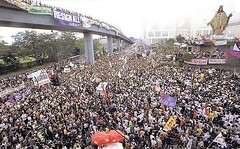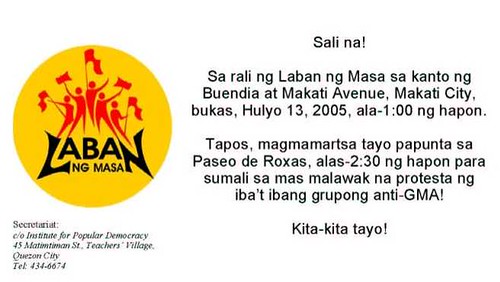I began this blog exactly a year ago with an entry Pursuing My Personal Legend when I was still in KL. Now that I have gone back here in Manila on August this year, with a masteral degree and a new job, I am still figuring out which path to take so as to pursue my personal legend. But I understand that the first question to ask is ‘what is, or what should be, my personal legend’? Should I examine this question at all? Or, am I asking the right question?
For several weeks now I’ve been pondering on the thought shared by a local artist in a television interview where he said that we should have pursued our childhood dream/ambition. I think he is right because when we were a child it was when our intentions were pure and pristine; and our inner courage was whole and intact. All of us still know our childhood dream, which - for one reason or another - many of us have now been alienated from. In fact, we have several reactions every time we are reminded of that childhood dream. Perhaps some of us feel sad of being reminded of it out of frustration or resentment. But for some, I included, being reminded of this dream succeeds in drawing a smile from the heart - what a lovely feeling this is indeed. From time to time, I find myself happy seeing and being with kids, especially babies. With their innocence and charming smiles, they never fail to give me strength, energy, inspiration, and happiness. At a personal level, I ask myself: can I still attain my childhood dream? Kaya pa, at kayang kaya! (Or, in the Malaysian English way of putting it: still can, and very much can!)
I, too, must admit though that I’m suffering from this seeming personal alienation, of a detachment from my true self. I am now in the process of re-discovering, and hence re-uniting, with this true self, hoping that soon I will wake up with my inner courage that knows no fear and be re-united with it.
I first learned this concept of alienation from my reading of Western political philosophy in the works of the romanticists Rousseau and Marx in their respective views on the essence of a human being whose true self and passion have been misdirected due to the evolution of the structural constraints and the values that come with it in the historical social structure. This learning has truly been helpful. But these days I appreciate this thought more deeply and at a more personal level by discovering Eastern philosophy - in particular, from the ideas of Buddha on anicca (impermanence), happiness, courage, contentment, mindfulness, enlightenment, and emptiness.
Indeed, I’m playing a relatively new game and venturing into a new path. But we can only play ‘a good game’ in life if we play it, and pursue its path, with a heart - in particular, a warrior’s heart, yet full of loving-kindness and happiness.



